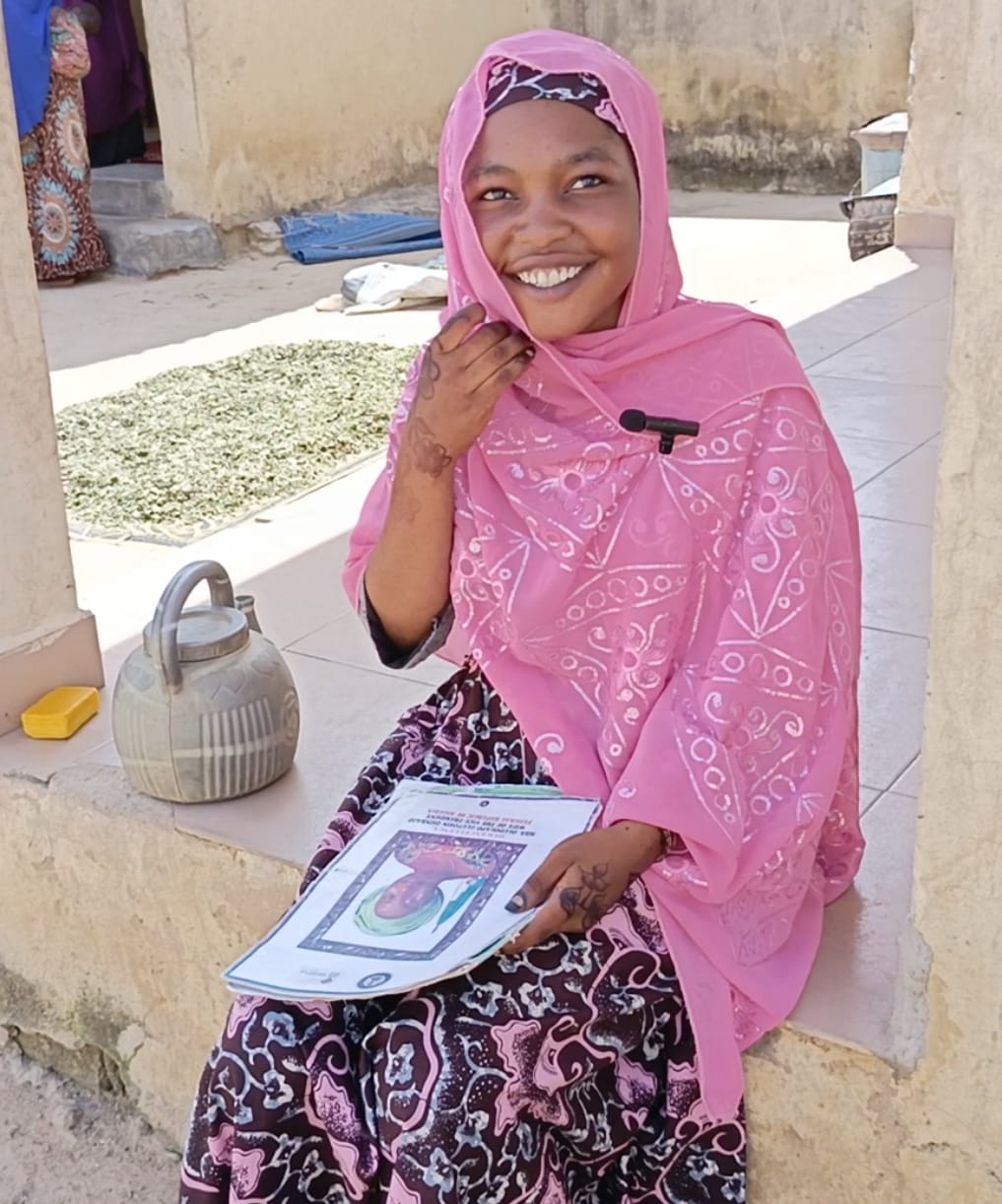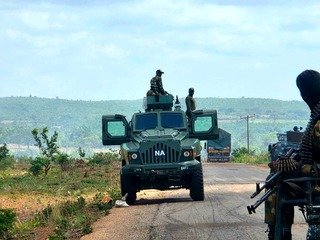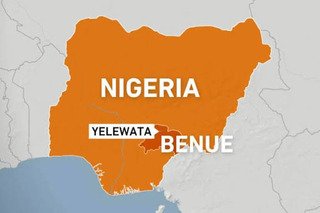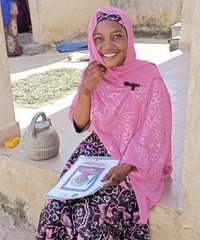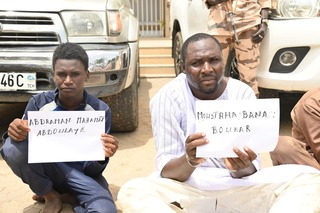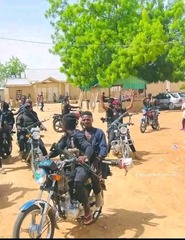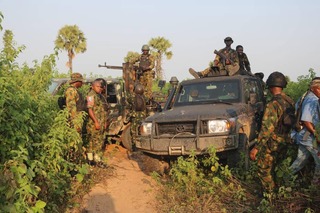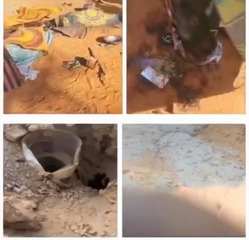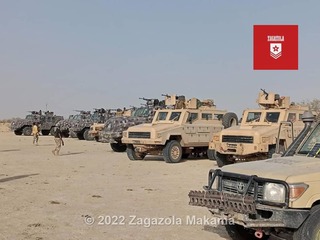From Displacement to Distinction: Story of Aisha, VP Shettima's ‘Adopted’ Daughter, Who Shines with 9 WAEC and 8 NECO Credits
By Abdulkareem Haruna
In the dusty resettlement community of Ngwom, Mafa local government, 19-year-old Aisha Ibrahim stands out as a beacon of hope and resilience. Born into a peasant family as the eldest of six children, Aisha has defied all odds to become the first in her extended family to attain secondary education. Her remarkable journey from an internally displaced person (IDP) camp to academic excellence is a testament to her determination and the transformative power of education.
It was nine years ago when Aisha, then a little girl living with her parents in the Bakasi IDP camp, caught the attention of Governor Kashim Shettima, the then-governor of Borno State and current Vice President of Nigeria. During a visit to the camp, Governor Shettima was moved by Aisha's courage and intelligence when she boldly stepped forward to address the visiting governor and his team about the challenges faced by the children in the camp. Impressed by her eloquence and passion, Shettima offered Aisha a life-changing opportunity: a scholarship from primary school through secondary school, with a promise to sponsor her education up to higher institutions.
In an interview with The Humanitarian Times Aisha recalls that fateful encounter with gratitude and a sense of destiny.
“I will forever be grateful to God and eternally thankful to Senator Kashim Shettima,” she says. “His words of advice stuck in my head and continued to spur me to work and study hard as a pupil and as a student, till I wrote my SSCE exams. And thank God I came out with good grades.”
With nine credits in her West African Examinations Council (WAEC) and eight credits in her National Examinations Council (NECO), Aisha has proven herself to be an exceptional student - and another testament to Shettima's inherent gift of visioning potential in people.
Her academic achievements have opened doors to a brighter future, but the realization of her dreams now hangs in the balance due to a lost connection with her once-promising sponsor, VP Shettima.
“I've met Senator Kashim Shettima a couple of times and he always urged me to work hard, be a good girl, and face my education,” Aisha reminisces
“Whatever I become in life tomorrow, I owe it to Senator Kashim Shettima, who is now our vice president of Nigeria. I was so happy the day he was declared the Vice President. But now he is very far away from us here, and seeing him show him my WAEC and NECO results seems impossible because we are now in Ngwom, a village 25km away from Maiduguri, and he is in Abuja.”
Aisha's mother, Nana Ibrahim, shares her daughter's sentiments with a mix of pride and concern. Originally from Monguno, a town in the northern part of Borno State, the family was forced to flee their home 10 years ago due to the insurgency. Despite the hardships and challenges of living in an IDP camp, Nana was determined to provide her children with an education.
“I have never been to school, and neither has anyone in my family; so I have always wanted my children to go to school and be better persons,” Nana says.
“When Governor Shettima offered to sponsor Aisha's education, I was overjoyed. I knew that this was a once-in-a-lifetime opportunity for my daughter.”
Nana recalls the day Aisha was selected for the scholarship. “Aisha was nine when Boko Haram forced us to flee Monguno to Maiduguri. We lost everything, but thank God our lives were saved. Fate brought us to Maiduguri thinking that my daughter who was in primary 3, then, would never go to school again,” said Nana Ibrahim's mother. “But then, Senator Shettima came into our lives and everything changed.”
Aisha's academic success has also inspired her younger siblings. Her sister, now in her third year of junior secondary school, also aspires to become a doctor. “Aisha has shown us that it's possible to dream big, even when you come from a place like this,” her sister says. “She is my role model.”
Driven by a fervent passion for education and inspired by their mother's relentless efforts to overcome their family's poverty, the Ibrahim family embodies the struggles of the typical impoverished family in northern Nigeria. Their father, a diligent laborer, spends more than half of each month away, assisting distant communities in cultivating their lands. In return, he receives a modest sum, which he brings home occasionally.
During the harvest season, Mrs. Ibrahim travels to Monguno to help relatives harvest and thresh grains. She earns a small fee for her labor, which she uses to pay for her children's school fees, though it is often insufficient.
Aisha could only view her WAEC and NECO results through her college teacher's phone. She has been unable to gather the N3500 required to purchase a login pin to download and print her results from a cyber cafe in Maiduguri.
“I'm working diligently to finish knitting this cap so I can sell it and raise the money to print my WAEC and NECO results,” Aisha explained. Her teacher had once sent her details of the results via WhatsApp on her old Android phone, but when the screen broke, she had to sell it. She used the small amount of money she received to buy the knitting threads she's now using to make the cap.
During his tenure as governor, VP Shettima prioritized the education of girls. In 2014, he made a groundbreaking record by sponsoring 30 female students on scholarships to study medicine in Sudan. Two years later in 2016, Governor Shettima’s administration signed an agreement with Ahfad University of Sudan to sponsor yet another 100 female students from Born State to study medicine. All of these young girls are now medical doctors working in various hospitals in Borno state today.
Senator Shettima’s commitment to girls' education was evident in his interactions with Aisha. He often said “As a father, I have a daughter whom I love so much and I would want what is good for my daughter for every other girl child in Borno state,” Aisha recalls.
However, the transition from governor to Vice President has created a chasm between Shettima and the young scholar. A recent attempt by Aisha's mother to reconnect with VP Shettima during a groundbreaking ceremony for a rural road project in Mafa was thwarted by security protocols.
“When the VP finally arrived, his security and protocol wouldn't permit such pleasantry even to the district head of the village, talking more of a poor ramshackle IDP woman,” Nana Ibrahim recounts.
As the VP and his convoy departed the venue of the groundbreaking ceremony, Nana Ibrahim waved and then approached a group of journalists whom she told her story even as she begged them to help convey her thanks to the Vice President.”
Despite the challenges, Aisha remains happy and hopeful. However, her apprehension of not being able to pursue her dreams at the tertiary level of education also cast fear upon her.
When The Humanitarian Times visited Aisha's home in Ngwom on a recent Sunday, the stark reality of their poverty was immediately apparent. The entire family sleeps on the bare floor, without any form of cushioning or pillows. Across the yard, a makeshift shack built from old corrugated sheets served as their kitchen. To enter, they had to stoop low due to its short height. Inside, a small 2-liter pot was on the fire, cooking white rice that would later be seasoned with a dash of spiced pepper and salt.
"Yes, the pot is small, but that's how we've always managed to get by because things are tough," Aisha said, her smile revealing a sense of contentment despite their circumstances.
In the center of the yard, a spread of harvested vegetables was laid out to dry. Once they were dried to a crisp, they would be pounded into a key ingredient for their soup.
They are also grateful to the governor of Borno state, Babagana Zulum, for providing a roof over their heads at the Ngwom resettlement village.
“We were once in the IDP camp, and now we have a building we call our home,” Aisha’s mother said.
She is also an inspiration to her younger sister, who is now in her third year of junior secondary school and also aspires to become a doctor.
Aisha's story is a sheer reminder of the potential of Nigeria's displaced children, the importance of education, and the need for continued support for these vulnerable populations.
As she looks towards the future, Aisha is determined to fulfill her dream of becoming a doctor, not just for herself, but for her community and for the countless other girls who dare to dream big, even in the face of adversity.
“Tell our father the Vice President that his daughter, Aisha, has passed all her exams and would like to advance her education as she had promised him,” Nana Ibrahim implored the journalists that covered the groundbreaking ceremony of a 22.5km rural road project awarded by the NEDC to connect their village to other communities and farmlands.
For Aisha, the journey continues, fueled by hope, resilience, and faith in the promise of a kind-hearted former governor who is now Nigeria’s Vice President.
*Abdulkareem is a Borno-based veteran conflict/humanitarian reporter, Editor at HumAngle, and Publisher of The Humanitarian Times

